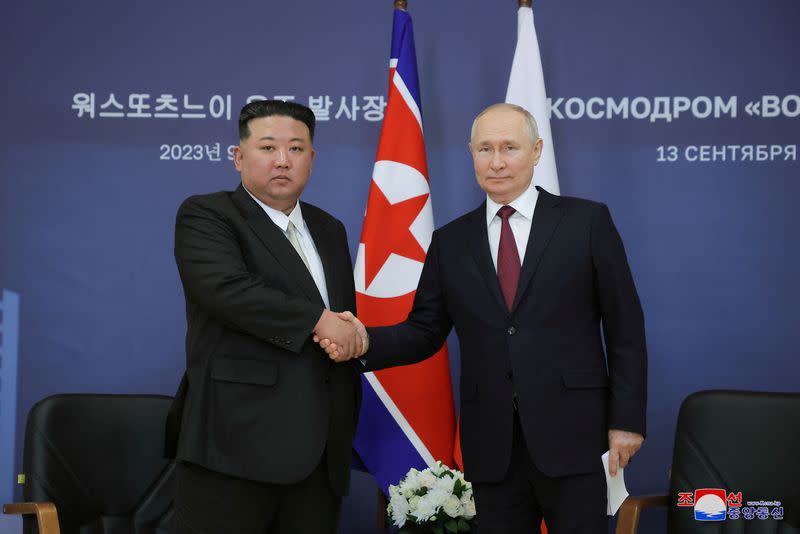Putin to visit North Korea for first time in 24 years

By Guy Faulconbridge and Josh Smith
MOSCOW/SEOUL (Reuters) -Russian President Vladimir Putin will visit North Korea on Tuesday and Wednesday for the first time in 24 years, the two countries said, underscoring Moscow's burgeoning partnership with the nuclear-armed state since the invasion of Ukraine.
North Korean leader Kim Jong Un extended an invitation to Putin during a visit to Russia's Far East last September. Putin last visited Pyongyang in July 2000.
In Washington, the White House said it was troubled by the deepening relationship between Russia and North Korea, and the U.S. State Department said it was "quite certain" Putin would be seeking arms to support his war in Ukraine.
Putin's foreign policy adviser Yuri Ushakov said Russia and North Korea may sign a partnership agreement during the visit that would include security issues.
He said the deal would not be directed against any other country, but would "outline prospects for further cooperation, and will be signed taking into account what has happened between our countries in recent years - in the field of international politics, in the field of economics ... including, of course, taking into account security issues."
Russian Defence Minister Andrei Belousov, Foreign Minister Sergei Lavrov and Putin's point man for energy, Deputy Prime Minister Alexander Novak, will be part of the delegation.
After North Korea, Putin will visit Vietnam on June 19-20, the Kremlin said. Both visits had been expected, although the dates had not previously been announced.
Russia has gone out of its way to publicise the renaissance of its relationship with North Korea since the start of the war in Ukraine, causing alarm among the United States and its allies in Europe and Asia.
Washington says North Korea has supplied weapons to Russia to help it fight in Ukraine, though Pyongyang and Moscow have repeatedly denied this.
U.S. State Department spokesperson Matthew Miller repeated charges on Monday that North Korea had supplied "dozens of ballistic missiles and over 11,000 containers of munitions to Russia" for use in Ukraine.
He said the United States had seen Putin "get incredibly desperate over the past few months" and look to Iran and North Korea to make up for equipment lost on the battlefield.
"So I'm quite certain that that is what he's up to," Miller said.
U.S. Deputy Secretary of State Kurt Campbell said last week Washington was concerned by what Russia would give North Korea in return.
"Hard currency? Is it energy? Is it capabilities that allow them to advance their nuclear or missile products? We don't know. But we're concerned by that and watching carefully," he said.
For Putin, who says Russia is locked in an existential battle with the West over Ukraine, courting Kim allows him to needle Washington and its Asian allies.
United Nations monitors concluded that at least one ballistic missile fired from Russia in Ukraine in January was made in North Korea. Ukrainian officials say they have counted about 50 such missiles delivered to Russia by North Korea.
"The list of countries willing to welcome Putin is shorter than ever, but for Kim Jong Un, this visit is a victory," said Leif-Eric Easley, a professor at Seoul's Ewha University.
"Not only does the summit upgrade North Korea's status among countries standing against the U.S.-led international order, it also helps bolster Kim's domestic legitimacy."
South Korea's vice foreign minister, Kim Hong-kyun, discussed Putin's Pyongyang visit in an emergency phone call with Campbell on Friday, Seoul's foreign ministry said.
The ministry expressed concern that the visit would result in more military cooperation between Pyongyang and Moscow, which it said violates U.N. resolutions.
Russia says it will cooperate with North Korea and develop relations in the manner it chooses and not be told what to do by any country, least of all the United States.
PUTIN AND KIM
The U.N. Security Council, where Russia wields a veto, imposed sanctions on North Korea after Pyongyang carried out its first nuclear test in 2006. Experts say Pyongyang has since continued the development of nuclear weapons and production of nuclear fissile materials.
In March this year, Russia vetoed the annual renewal of a panel of experts monitoring enforcement of the U.N. sanctions. South Korea's U.N. ambassador compared that move to "destroying a CCTV to avoid being caught red-handed" violating the sanctions.
Russia has said that world powers need a new approach to North Korea, accusing the United States and its allies of seeking to "strangle" the reclusive state.
Jenny Town, of the 38 North programme studying Korea at Washington's Stimson Center think tank, said Russia's outreach to Pyongyang is part of efforts to build an alternative to a U.S.-led world order.
"There is reason to believe that Russia sees value in North Korea as a military partner in that war against the West, which does incentivise them to do more beyond just the arms deals for supplementing Russia's war-fighting efforts in Ukraine," she said.
For North Korea, its relationship with Russia brings support at the U.N. as well as "immediate and tangible results" in terms of economic, military and agricultural cooperation and trade that the countries have not had since the 1990s, Town added.
Kim travelled to Russia by train in 2019 and again last year when he and Putin toasted each other over Russian wine.
(Reporting by Guy Faulconbridge in Moscow and Josh Smith in Seoul; Additional reporting by Ju-min Park in Seoul and David Brunnstrom In Washington; Editing by Mark Trevelyan, Peter Graff, Angus MacSwan and Sandra Maler)

 Yahoo News
Yahoo News 
